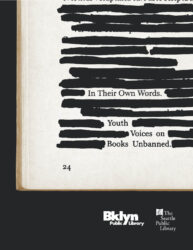 Book bans are on the rise across America. Last year, The Seattle Public Library took a stand with the Books Unbanned e-card program.
Book bans are on the rise across America. Last year, The Seattle Public Library took a stand with the Books Unbanned e-card program.
Young people nationwide can now access the library’s full digital collection. Books Unbanned is entirely funded by donors to the Foundation’s Equity & Access Fund (click to give!).
As of this month, more than 8,000 young readers have signed up, from all 50 states, Washington D.C., Puerto Rico, and Guam. New cardholders have checked out more than 137,000 digital books.
University of Washington graduate students recently completed a report on the experience of program cardholders, called “In Their Own Words: Youth Voices from Books Unbanned.” Their findings, from users of Seattle and Brooklyn Public Library’s programs, are a powerful reminder of why the freedom to read matters.
Many users reported that their local library restricts access to materials reflecting people of color and LGBTQ+ people. This censorship creates feelings of isolation and discrimination. Cardholders often use the program to specifically seek out banned titles. Some don’t feel comfortable checking out books on certain topics in their hometowns.
“There are books that I cannot take home because they would put me in danger. Reading digitally allows me to keep myself safe but still give[s] me the ability to read freely.” (Age 19, Virginia)
For other readers, Books Unbanned lowers different barriers. Many young people can’t afford to buy the books they want. People with disabilities can face challenges visiting a physical library or finding titles in accessible formats.
“There is no public library in my town… and the… library (closest to me) asks for a $50/year charge for non-residents, which [I] cannot afford.” (Age 26, Tennessee)
Some cardholders said their libraries are underfunded and have limited collections. Some don’t have access to a library at all. They may live in a rural area or lack reliable transportation. They may have a library that is often closed, or one that does not allow them to get a library card due to residency or ID requirements.
“The library closest to me is very underfunded, and it is very conservative. It has a plethora of Christian novels, but their novels surrounding people of color and [other] religions are very limited. As a person of color, it sucks to not be able to see myself in novels I read.” (Age 17, Texas)
The UW report puts it best: “For many young people, digital access to books is essential to the ability to read freely.”
Read the full report, including many cardholder testimonials, here.
Your support for the Foundation’s Equity & Access Fund makes Books Unbanned possible. Stand up for the freedom to read and give today!

